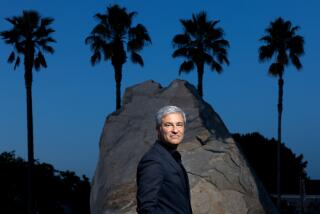Letters: Debating MOCA’s direction
- Share via
Re “MOCA director takes on his foes,” Aug. 5
Jeffrey Deitch, director of the Los Angeles Museum of Contemporary Art, seems to think that having more popular exhibits and bigger crowds will save MOCA. But where will people go if they want a more enriching experience than looking at some Dennis Hopper paintings?
True, “Art in the Streets,” MOCA’s exhibition on graffiti, had visual impact. It highlighted a specific and largely unfamiliar sphere of urban culture. But there was not much below the surface. It existed without context, like reality TV. It didn’t stimulate or broaden aesthetic sensibilities.
As a huge fan and years-long member of MOCA, it is disheartening that Deitch intends to forge a new frontier by pandering to popular tastes and following cultural trends. We already have 24/7 cable TV for that.
Tobi Dragert
Los Angeles
How long does it take for the avant garde to become the old guard? With the resignations of the four artists on the MOCA board of trustees, we have our answer. Their ages range from 51 (Catherine Opie) to 81 (John Baldessari), with an average age of 68 years. So assuming that on average they became productive at age 30, it only takes 38 years — about one generation.
Deitch knows that the cutting edge alarms those invested in the past.
James Manifold
Claremont
The Times quotes MOCA guest curator Aaron Rose as asking, “Could it be time to pass the torch to the next [generation]?,” meaning that Deitch represents a new generation of youthful exuberance.
This familiar cultural dialectic of moralistic generational development is not appropriate for MOCA. The erroneous assumption here is that MOCA was a traditionalist institution before. The historical record shows the opposite to be the case.
Deitch’s idealization of pop culture, Andy Warhol and the genericness of Hollywood culture is a regression from the previous curatorial identity of MOCA, which saw pop art and culture in a more critical if less idolatrous view, but also as understanding the importance of differentiating between cultural forms while simultaneously negotiating their interrelationship.
We can instead reflect on the fact that thinking of Warhol as radical and progressive today is equivalent to thinking the same of the experiments of Picasso and Braque in 1962.
Stanley Kaplan
Los Angeles
I’ve been to more MOCA exhibits (both at the Grand Avenue and Geffen Contemporary locations), events and openings in the last two years than in the previous 30 years of MOCA’s existence. I’ve seen lots of fun, interactive and conceptual pieces and performances from local and international contemporaries.
Let Deitch do his thing. MOCA will be fine, and people will show up.
Ann Zumwinkle
Los Angeles
ALSO:
Letters: Success at others’ expense
Letters: Killing is always a hate crime
Letters: Taxing a gold medal seems fair
More to Read
A cure for the common opinion
Get thought-provoking perspectives with our weekly newsletter.
You may occasionally receive promotional content from the Los Angeles Times.






